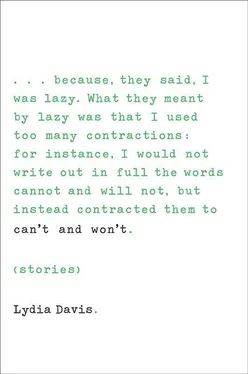I had sudden generous impulses. I wanted to give money to my friends, and I wanted to give twenty-dollar bills to strangers in the city. I thought of donating something to the sad, shabby bus station, maybe some large plants and a shelf of books for the waiting area.
Then I was warned by a friend who had been through this before. She said to watch out: I would have an almost irresistible impulse to give all the money away.
There were many things I had wanted to do in my life and had never done because there was no time. I am not graceful, but I like to dance. I wanted to sing, even though my voice is thin and weak. But of course this award was not given to me for those things. The Foundation had not intended to support me during the time I spent dancing and singing.
I used to dream about the nice things I would buy if I had enough money. Now a combination of shame and caution stopped me from spending the money freely or foolishly. I did, though, sometimes think about what I wanted to buy. I had a list: I wanted a canoe, an old wardrobe, a better piano, a dining table, a small piece of land, a trailer to put on it, a fishpond, some farm animals, and a shed to keep them in. This was in addition to some nicer clothes.
I thought I had to be careful, though. If I bought something that was not necessary but that gave me pleasure, it might be expensive to keep, like the nice piece of land, on which I would have to pay taxes. Or it might require constant care, like the farm animals.
I never did buy any of those things.
After there was a notice in the college newspaper, I expected reactions and questions from the students at the next class. I was looking forward to the chance to talk to them about this exciting event. I wanted to talk to them about research, and how exciting it can be. I thought it would be easy to talk about this, and interesting, and it might increase their respect for me. I am much better in the classroom if I think they respect me. I prepared for this discussion, imagining their questions and thinking of some answers. But none of them had heard the news, and no one said anything about it. Since I had prepared for their interested questions and not for their blank silence, I was even stiffer and more awkward than usual.
Now I see why I have been writing to you so much about teaching. I did not dare tell myself, before, just how much it bothered me, because I had to live with it. Then I thought I would never have to teach again. That was when I could admit that it was the worst torture — to be placed in front of that audience of indifferent or even possibly mocking young students.
At first I thought my fear confronting the class was reasonable: what could be more terrifying than to stand up there in front of those ranks of critical or indifferent or contemptuous young people, exposed to their eyes and their thoughts in all my uncertainty, my unimpressive exterior, my lack of training, my lack of confidence and command. There was some truth to that. But I have done this over and over again at different schools for years now. Finally, at the start of that important year, the year of your phone call, when my fear had not lessened or vanished, as I thought it might, now that I had had some experience at this particular college, I had to face the fact that my fear was exaggerated and unnatural. Certain friends agreed with me.
For instance, on the very first day of classes the first year I taught at this college, I had what I now think was a psychosomatic injury, if that’s the right term for an injury caused purely by an emotional condition: I woke up with a large blood clot in one eye. To myself, looking in the mirror, I seemed grotesque, monstrous. I don’t know if, when I stood there confronting the class later that day, the students noticed this blood clot. Since of course they would not say anything to me about it, I never knew. And it is true that students of that age are in general more interested in their own business than in any teacher, with or without a blood clot in her eye.
Later in the term, I developed such a bad infection in the tip of one finger from an embedded sliver that I required surgery, and I wore a large bandage to class. The surgery left a permanent scar and indentation in that fingertip, and some loss of sensation. I can’t help seeing this injury, too, as a pathetic attempt to disable myself so that I could not teach.
After the finger had healed and the bandage was off, I began falling asleep at odd times, for several minutes at a time. I fell asleep not only on the bus, which was not so surprising, but also in my office, with my head down on my desk or tipped back, and in my car, in parking lots after shopping, and lying in the dentist’s chair, and sitting in a row with other patients in the office of the eye doctor, waiting for my eyes to dilate. Obviously, I must have thought that falling asleep was one way to avoid my situation for at least a little while.
During the whole term, I wore black — a black coat, black shoes, black pants, and a black sweater — as though it were some sort of protection. Black was certainly a strong color, and maybe I thought that appearing in black would convince the students that I was a strong person. I was supposed to lead them in a confident way. But I did not want to be their leader — I have never wanted to be anyone’s leader.
When I wasn’t expecting it anymore, the students began to find out about my award and to ask questions. They seemed really interested in the news. They seemed to enjoy the sudden minor campus celebrity of their teacher. The novelty, the break in routine, which I welcomed, probably relieved them, too. Whenever anything out of the ordinary takes place in the class, such as a sudden thunderstorm, or a blizzard, or an electrical outage, or my appearing with that large bandage on my finger, I relax a little and the hour goes better.
* * *
The teaching was almost over for the semester. The last class would meet in eight days.
I was feeling the approach of death, maybe because the time was coming when the Foundation would give me my first check. The only thing that could stop me from receiving the money in January was my own death. So I was thinking that the new year would inescapably bring either my death or the first check from the Foundation.
At the last class, we had a party of sorts, although I made them do some classwork first. I had carried two bottles of cider up on the bus in a backpack, along with a bag of good cider doughnuts. We arranged the chairs in a very large circle, although that was not my idea. I could not think how to conduct a party with twenty-five undergraduates. I did not think it would be very festive for them to sit in rows facing me and eating their messy doughnuts. But to move the chairs out of the way and mill around standing up, as at a cocktail party, also seemed awkward, since not all the students were friends with one another.
Now I was a little sorry to say goodbye to them. It was easier to miss them and think fondly of them when I didn’t have to be afraid of them anymore.
Once the classes were over and the burden of teaching was taken away, of course I continued to teach in my own imagination, thinking of yet another reading assignment or smart comment. I imagined them all sitting there, receptive and interested, whereas actually they were by then sitting in other classes, or still on vacation, and not giving me or my course another thought, except maybe to wonder what their grade would be.
Soon after the new year, I met with a tax advisor, and he gave me some bad news. A large part of the grant would go to paying taxes — on the grant! Another part of it would have to be put away in a special account — to avoid being taxed. What was left would not be enough to live on. I realized that I would have to continue looking for small, temporary jobs in almost the same way I did before. But I still thought I would not have to teach.
Читать дальше












